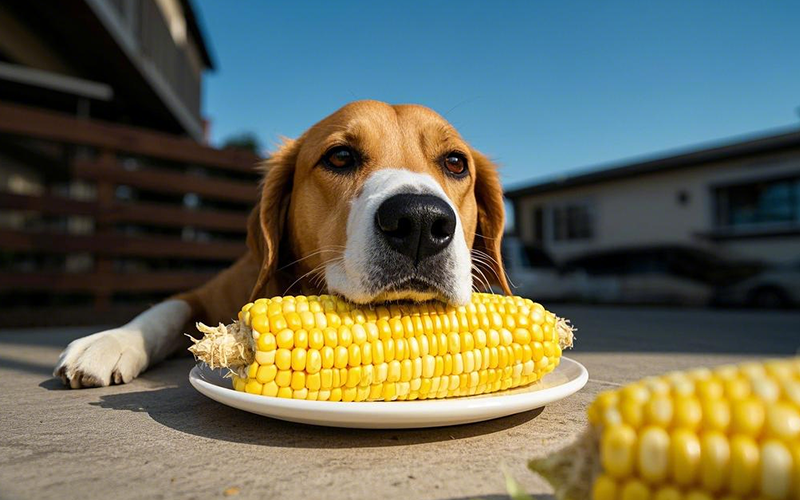Can Dogs Eat Maize? Safe or Risky?
- 6 Mar 2025 10:01
If you're wondering, "Can dogs eat maize?", the answer is yes, in small amounts, maize (corn) can be safe for dogs. However, there are a few things to keep in mind to ensure it's a healthy treat for your pet. Corn is often found in many commercial dog foods, but there are specific precautions to consider.
In this guide, we’ll explore:
✅ Benefits of maize for dogs
🚫 Risks and dangers of feeding maize to dogs
🐾 How to safely offer maize to your dog

Is Maize Safe for Dogs? ✅
Maize, or corn, can be a safe and healthy addition to your dog’s diet when prepared properly. It contains various nutrients that may benefit dogs in small quantities:
✔ Rich in Carbohydrates
Corn is a good source of energy for dogs, providing carbohydrates that can support daily activities.
It can serve as a filler in many commercial dog foods, especially for active dogs who need extra fuel.
✔ Fiber for Digestion
Maize contains fiber, which can aid in digestion and help regulate your dog’s bowel movements.
✔ Vitamins and Minerals
Maize provides essential nutrients like vitamin B, iron, and magnesium, which support general health.
Risks of Feeding Maize to Dogs 🚫
While maize can be beneficial, there are some important risks to consider:
⚠️ Allergic Reactions
Some dogs may be allergic to corn, which can lead to symptoms like itchiness, ear infections, or digestive upset.
If you notice any unusual signs after feeding corn to your dog, stop immediately and consult a pet professional.
⚠️ Choking Hazard
Corn kernels, especially when served on the cob, can pose a choking hazard to dogs.
Always remove the corn from the cob before feeding it to your dog.
⚠️ Digestive Problems
Too much corn can be hard for dogs to digest and may lead to gas, bloating, or diarrhea, especially if they’re not accustomed to it.
⚠️ High in Calories
Although corn can provide energy, it is high in calories and can contribute to weight gain if overfed, especially in inactive dogs.
How to Safely Offer Maize to Your Dog
If you choose to feed your dog maize, make sure to do so in moderation and take these precautions:
✔ Remove the cob – Always serve maize off the cob to prevent choking.
✔ Serve small amounts – Offer corn in small amounts as a treat, not a main meal.
✔ Avoid butter or seasoning – Plain, cooked corn is the safest option. Avoid adding butter, salt, or other seasonings that may be harmful to dogs.
✔ Cook it thoroughly – Ensure the corn is well-cooked to make it easier for your dog to digest.
What If My Dog Eats Too Much Maize?
If your dog eats too much maize, keep an eye out for these signs:
🚨 Vomiting or diarrhea
🚨 Bloating or abdominal discomfort
🚨 Excessive gas
If these symptoms occur, contact a pet professional for advice.
Final Verdict: Can Dogs Eat Maize?
✅ Small amounts of maize are safe for most dogs.
🚫 Avoid feeding corn on the cob or large quantities to prevent choking or digestive issues.
❌ Watch for any signs of allergies or digestive upset.
💡 Need quick advice on pet health? Try PettureX, the 24/7 AI pet assistant, to get instant answers on pet-related concerns!
Would you like to know about other foods that are safe or risky for dogs? Let me know! 🐶🌽
Related

Why is Regular Dog Grooming So Important?
- 21 Jun 2025
Can Dogs Eat Kiwis? A Vet-Approved Guide to This Fuzzy Fruit
- 10 Jun 2025
Can Dogs Eat Curry? Unpacking Risks, Benefits, and Safe Alternatives for Your Canine Companion
- 3 Jun 2025
Can Dogs Eat Cooked Carrots? A Crunchy & Colorful Canine Query!
- 29 May 2025
Can Dogs Eat Cooked Cabbage? Unveiling the Crunchy Truth for Your Canine!
- 29 May 2025
Can Dogs Eat Citrus? Peeling Back the Zesty Truth for Your Pup!
- 28 May 2025
Can Dogs Eat Cinnamon Applesauce (A Little Bit)? The Sweet and Spicy Truth!
- 28 May 2025
Can Dogs Eat Chorizo? Sizzling a Warning for Your Furry Friend!
- 27 May 2025
Can Dogs Eat Chili? A Spicy Topic for Canine Consumption!
- 27 May 2025
Can Dogs Eat Raw Chicken? Unveiling the Risks and Realities
- 26 May 2025
